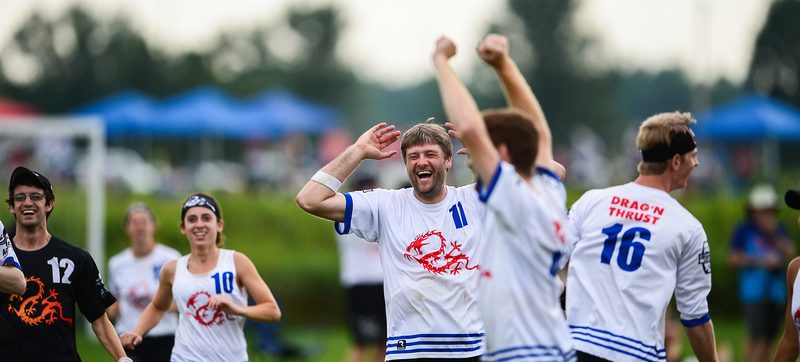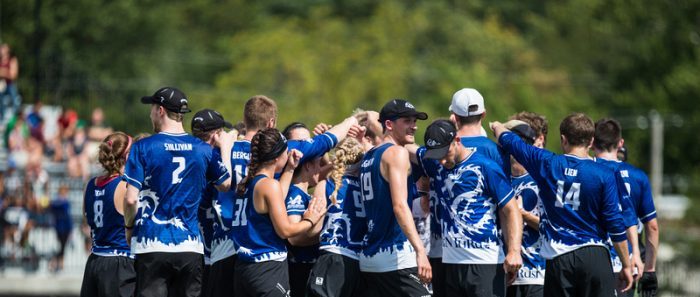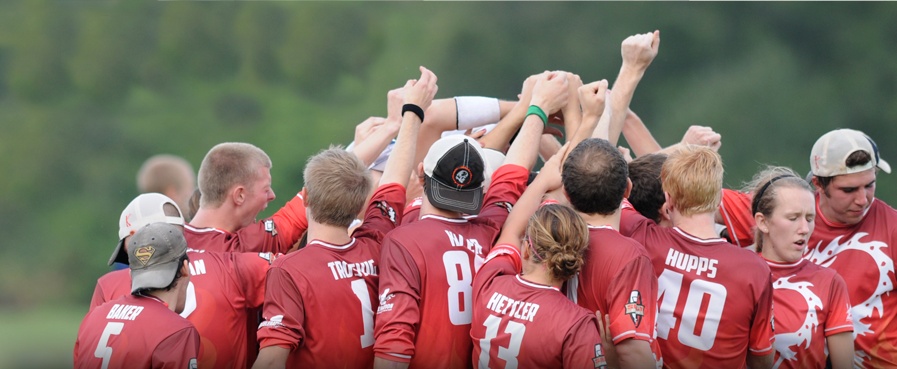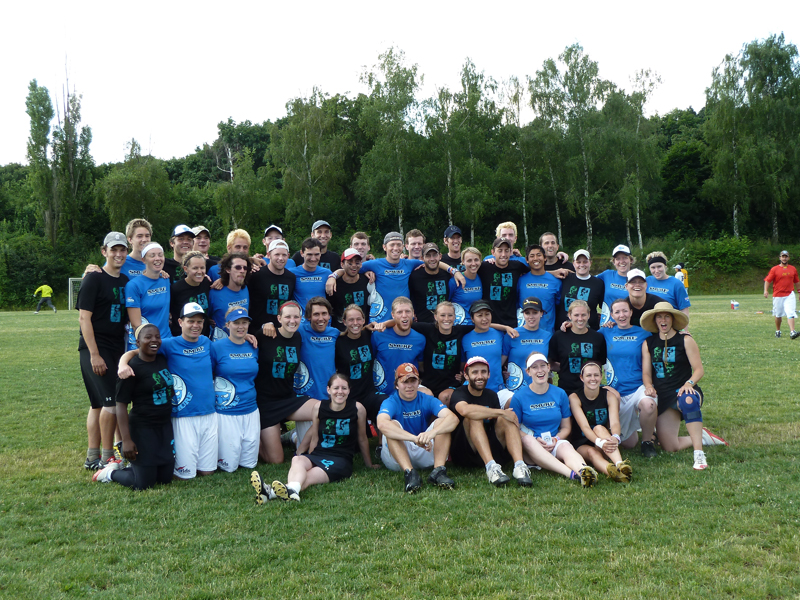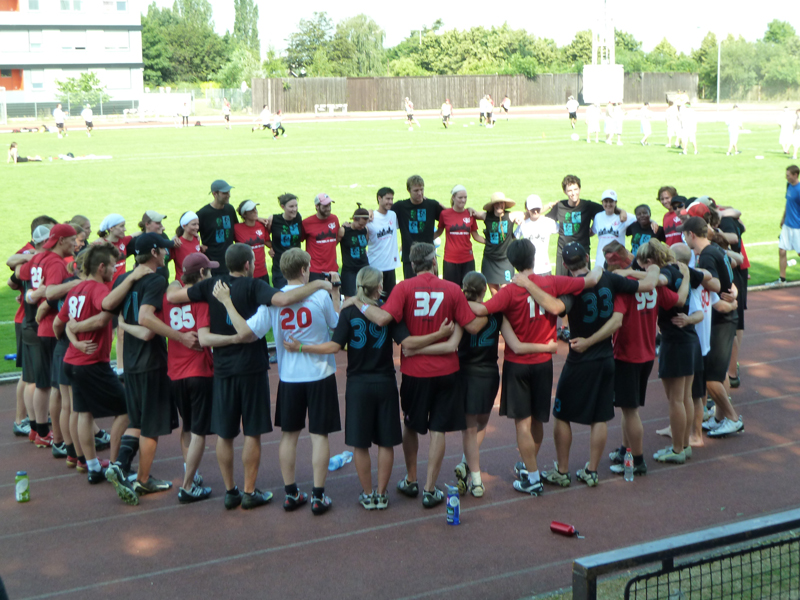By: Pat Niles
There are plenty of things that I’ve taken away from being able to compete and win at the largest international stage for club ultimate. Competing with CLX at WUCC Worlds 2010 in Prague showed me plenty of things aside from it’s Soviet era dormitories, delicious Czech cafeteria food, constant 95 degrees with no A/C, and long, over-packed, shuttle rides down the hill to the fields. This experience taught me about what it takes to win, the strength of the USA Ultimate scene, and the power of the culture of Ultimate and it’s players. Now that playing for Drag’n Thrust has allowed me the chance to return to Worlds again, I’ve been thinking about why I love Ultimate so much and why I’m incredibly pumped for another shot at the WUCC competition. I think after watching the Olympics, I’m most excited about the spirit that teams show toward one another. This community is simply amazing.
As a note, this perspective will be written with the Mixed division in mind, since that’s where I’ve played all of my club Ultimate career. I also wanted to pull more specific facts and stats for this article, but the Score-o-matic site that was hosting the results does not appear to be up anymore.
One of the things that most impressed me about the competition at Worlds was the wide range of abilities and levels of the teams. While the US teams seemed to have a grip on the top spots, there were some very strong teams from other countries, Onyx and RIP (Canada), Newcastle Pie Wagon and Smurf (Australia), and Upsadaisy (Austria), that stepped it up to round out the top 10. (Smurf was an insanely fun, and nerve-wracking universe point game. They’re a great team.) A recent article, How Can Non-US Teams Close the International Gap?, made some very good suggestions on how to get other teams to be able to compete with the US. Looking at the results from WUCC 2010 (I understand this was 4 years ago), it is clear that there is a gap separating the top US teams from some countries, but it’s not a clear picture across the board. I also think that WUCC is a bit better at gauging the strengths of countries’ programs, rather than looking at the World Games results. The population of the US and the overall population of players in the US push our top end higher when it’s the best players in the country playing. Club team competitions, such as WUCC, disperse that talent and the international teams are much more likely to be able to compete. The Olympics comes to mind with the utter domination of the Netherlands speed skating program. This result, although not unprecedented, shows that almost anything can happen in international competition. I’m excited to see the level of competition that shows up in Lecco.
At the other end of the spectrum, Ultimate DeLux inspired me. The team was composed of the only 20-some Ultimate players in Luxembourg at the time and I can remember the game vividly. We had to trek down a half mile gravel hill trail, through the woods, to an old, abandoned, soccer field. CLX had the lead for the entire game; it was a 16-0 lead (games to 17), when Ultimate DeLux scored their first and only point against us. When they scored, they celebrated like they had just won the tournament. It was possibly the most refreshing thing I’d seen playing competitive club Frisbee in a long time. The Jamaican bobsled team in Sochi was equally touching and their underdog position made them one of the most popular teams at the Olympics, gathering support to raise $178,000 to even make it to the Olympics, inspiring The Bobsled Song, and eventually taking last place against much stronger competitors. During their final run, the NBC commentator said (I’m paraphrasing) – “the Jamaican bobsled team is the most popular here. If you’re looking for a video of how to drive a bobsled, this will not be it, but they’ve promised to race the hell out of this course.” I love that aspiring teams such as the Jamaicans and Ultimate DeLux have the chance to compete at the top level. It reminds me that we were all once beginning ultimate players, playing against powerhouse teams, giving everything you’ve got, even though there’s little chance for victory. There will undoubtably be teams like this in Lecco this year and I will once again respect them for the amount of commitment and love they have for the sport.
The last piece I want to talk about is the Olympic Spirit, one story in particular, and how I think that relates to Worlds and our Spirit of the Game. After the 15k Classic Cross Country skiing event in Sochi, the winner, Dario Cologna waited more than 25 minutes to congratulate and shake hands with the last place finisher, Roberto Carcelen. To me, this exemplifies the aspect of Spirit of the Game and definitely shows the respect that one competitor should have for another in any sporting event. Before going to Worlds in 2010, I, along with most USA Ultimate players, thought that having a “Spirit Circle” at the end of a game was very representative of the hippie-era of Ultimate. But after competing in Prague, I have a new found respect for the circle and the results. There’s an understanding that you have to look your opponent in the face at the end of the game, and knowing that, players change the way they approach their opponents and the way they play their game. That level of respect and understanding can really change the enjoyment you have during the game. As Dave Klink stated in “Understanding Disagreement”, ” it turns out the game is more fun this way.”
I’m not sure what will happen at Worlds in Lecco this year. But, if there’s one thing I know, it’s that despite whatever success Drag’n Thrust has I will still have a blast playing new faces and reveling in Ultimate at the highest level of competition. I’m excited to fall more in love with our sport.
